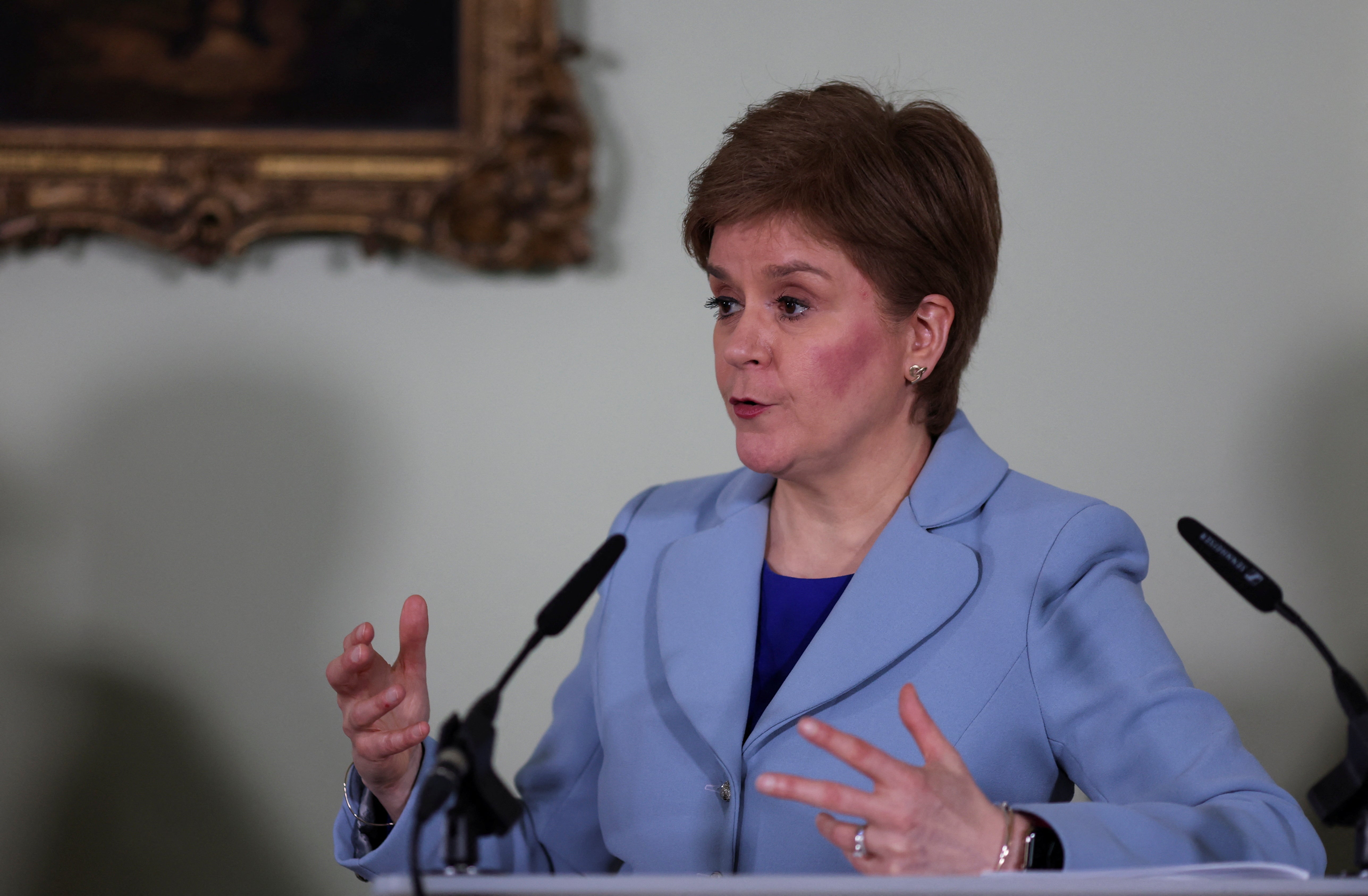Sturgeon urges PM to ‘be a democrat’ as she launches case for Indyref2
Scotland’s First Minister said her government has an ‘indisputable mandate’ for another vote on independence.

Your support helps us to tell the story
From reproductive rights to climate change to Big Tech, The Independent is on the ground when the story is developing. Whether it's investigating the financials of Elon Musk's pro-Trump PAC or producing our latest documentary, 'The A Word', which shines a light on the American women fighting for reproductive rights, we know how important it is to parse out the facts from the messaging.
At such a critical moment in US history, we need reporters on the ground. Your donation allows us to keep sending journalists to speak to both sides of the story.
The Independent is trusted by Americans across the entire political spectrum. And unlike many other quality news outlets, we choose not to lock Americans out of our reporting and analysis with paywalls. We believe quality journalism should be available to everyone, paid for by those who can afford it.
Your support makes all the difference.Scotland’s First Minister has urged the Prime Minister to “be a democrat” as she claimed her government has an “indisputable mandate” for another vote on independence.
Nicola Sturgeon kicked off a new campaign for another vote on Tuesday with the release of a document laying out the economic and social differences between Scotland and other small countries, attributing the deficit to not having the full powers of an independent country.
She also promised a “significant update” in the near future on how such a vote could be held without the powers being granted by Westminster.
I stand ready to negotiate a Section 30 order, if you decide that you now are a democrat
She recalled that when she was re-elected as First Minister last May it was on a “clear commitment to give the people of Scotland the choice of becoming an independent country”.
Ms Sturgeon also noted Holyrood has a “decisive majority” of MSPs in favour of independence, arguing as a result that “the Scottish Parliament therefore has an “indisputable democratic mandate”.
She claimed if the UK Government “had any respect at all for democracy” it would grant a Section 30 order, allowing a legally binding referendum to be held, as happened in 2014.
The First Minister conceded that the right of the Scottish Parliament to legislate for a referendum was “contested”, adding that she remains open to negotiations with the UK Government on granting of the necessary powers.
“I stand ready to negotiate a Section 30 order, if you decide that you now are a democrat,” she said, addressing the Prime Minister directly during a press conference at Bute House in Edinburgh.
“I have to say, the evidence of that up to date is not promising, but I’ll set out what we do in those circumstances if he continues to deny democracy very soon.”
But the First Minister also said the Scottish Government would have to look for a way to hold another vote if such an order was not forthcoming from the UK Government.
“My duty, as the democratically elected First Minister, is to the people of Scotland, it is not to Boris Johnson or to any Tory prime minister,” she said.
“This is a UK Government that has no respect for democracy.
“That means if we are to uphold democracy here in Scotland we must forge a way forward, if necessary, without a Section 30 order.”
Throughout her speech in Bute House and in her answers to journalists, the First Minister accepted that Scotland becoming independent does not guarantee that things will improve.
But she said that not being independent in recent years has been to Scotland’s “great cost”,
“The very fact of just being independent, for any country in the world, doesn’t magically guarantee success,” she said.
“What it does do is put the levers that determine success into your own hands.”
She added: “It’s not possible to see into the future, five, 10, 20 years from now, for any country.
“Any country will face challenges and setbacks. The question is: what is the best system of governance to equip you to deal with those?”
Ms Sturgeon went on to say Scotland would have voted to become independent in the first vote in 2014 – when the Yes campaign lost by 45% to 55% – had they known Scotland would leave the EU with the UK after the Brexit referendum, and that Boris Johnson would become Prime Minister.
The First Minister went on to say forecasts of low growth and high inflation in the coming years are “guaranteed” if Scotland remains within the UK.
“The question is then: do we just accept that, or do we look at comparator countries that have all been dealing with the same challenges in terms of Covid and the wider issues around cost of living that the UK is and are performing much better?” she asked.
“And do we decide that the sooner we get onto that path, then the earlier we will work our way towards the kind of success that they enjoy.”
The First Minister was not able to give a projected timescale for a post-independence Scotland’s economy to reach the level of those in the document, which included Norway, Switzerland and Denmark.
A spokeswoman for the UK Government said: “Now is not the time to be talking about another referendum.
“People across Scotland rightly want and expect to see both of their governments working together with a relentless focus on the issues that matter to them, their families and communities.
“That means tackling the cost of living, protecting our long-term energy security, leading the international response against Russia’s invasion of Ukraine and growing our economy so that everyone has access to the opportunities, skills and jobs for the future.”